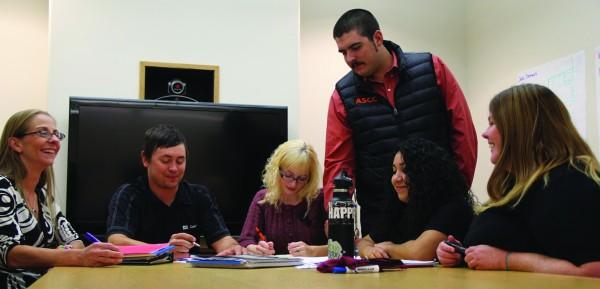“We are a different breed of students,” said Associated Students of Cascades Campus vice president, Rosie Laurie. “I think it’s really important that our students get out in the community and make people understand that we are not a typical university.”
In her new position on student government, Laurie hopes is to embrace and encourage this diversity on campus, both in the educational and innovative sense.
Laurie is not alone in this goal. The remainder of the Oregon State University-Cascades campus council is focused on meeting supporting students and engaging the community during a time of university growth.
Getting to know the council
ASCC already has six new council members moving into new roles, and each promises to take a new direction with the group. Jack Vanderlinden will serve as the president for the year, while Laurie will take over vice president, Damaris Monroy will step into the secretary and treasurer position, Kyle Schenk will act as the activities coordinator, Jesse James-Evans will take program coordinator and Kira Ashley will be the marketing and public relations coordinator. Each council member will approach their positions with a different background, and set of goals.
For Laurie, getting involved with student council was a long-cherished plan. Laurie had made contact with ASCC during the previous year, and volunteered regularly in different capacities at OSU-Cascades, before moving into her current role.
Schenk’s motivations are similar, and include networking with locals. His hope is to work with businesses like Hydro Flask and 10 Barrel Brewing Co., and to work on overall community relations.
“One of my main goals is to better my relationship with the community through the school, and to help students do the same thing at the same time,” Schenk said.
For Monroy and Ashley, enriching their college experience is a primary motivation.
“I wanted to make more connections and enrich my lifestyle. Coming to ASCC, even just in the summer, I’ve made lots of connections locally and with other students,” Ashley said.
New initiatives
As the council members move into their new roles, they will be facing an onslaught of change, some of it self-directed.
For one, as OSU-Cascades has the city approval to begin construction on their 10-acre parcel, the growth will entail legislative lobbying. ASCC expects to take part in this process. The year has been declared “OSU year” at the state capitol, which means ASCC plans to help lobby for funding. One of their focal points might be a grant passing through legislature in the near future.
The grant, will inevitably be won by OSU-Cascades. However, what it is used for remains the question. Currently two initiatives are vying for the allocation of money, one of which would provide funds to expand Bend’s Cascades East Transit capabilities on the west side.
The other side of the initiative would give the Graduate and Research Center more room space. According to Laurie, the CET initiative would address more direct concerns.
“Kelly Sparks is definitely on that initiative, and if it’s passed it would push for CET to run longer, have a route that’s goes faster, like an express route, that goes from east side to west side, where we wouldn’t have to stop at the hub,” Laurie said. “That’s really the only way we can say ‘everybody ride the bus,’ is if the bus is adequate for rides all the time.”
ASCC also hopes to develop the application process for student groups. In the past, clubs have been able to start up without any process of recruiting, or showing that they are sustainable.
“It’s a long process, because we’re having to change some pretty standard procedures,” Laurie said. “We’re trying to take more of a student-led committee, versus just go to Andrew and start your club.”
Part of the clubs work has to do with creating a more open atmosphere. ASCC is currently trying to create an overview committee that informs clubs about what each student group is doing. The committee would gather student group presidents together for a monthly meeting, the effect of which would be diffused into each group.
The university growth will also allow for the student government to become more of a “university student government,” according to Laurie.
“Our student government is pretty small in comparison to most other student governments,” Laurie said. “The club council is really trying to bridge that gap between our student government, student fee and clubs – and that’s part of getting the leaders of different clubs involved.”
Junnelle Hogen | The Broadside
(Contact: [email protected])














